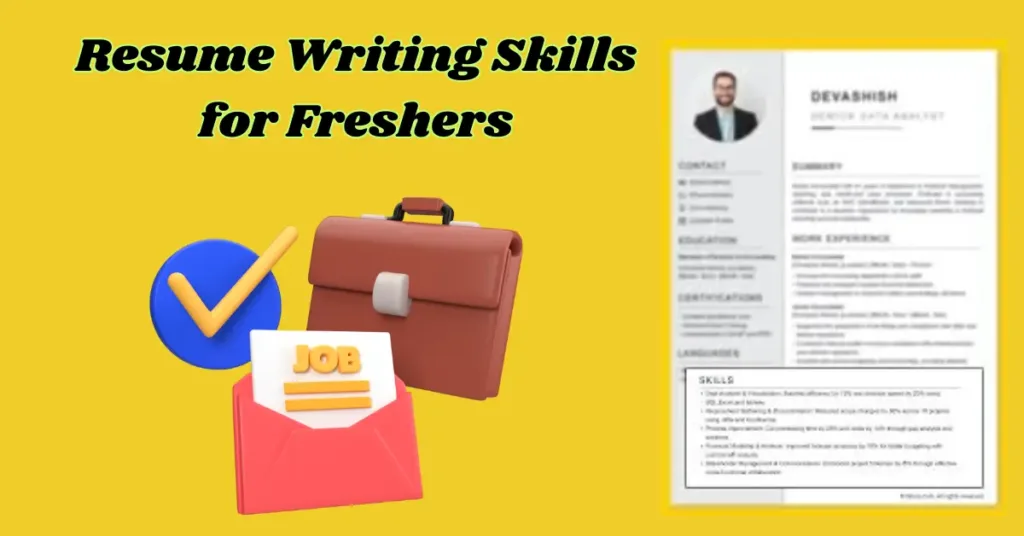Stepping into the professional world as a fresher is both exciting and challenging. With little to no work experience, your resume becomes the key tool to showcase your potential, education, and skills to prospective employers. Knowing the right resume writing skills for freshers is essential to create a strong first impression and land interviews.
In this guide, you’ll learn how to structure your resume, highlight relevant strengths, and use the right strategies to stand out — even without prior job experience.
Why Is Resume Writing Important for Freshers?
For freshers, a resume serves as:
- A first point of contact with employers
- A summary of educational background, internships, and soft skills
- A demonstration of communication and professionalism
A well-written resume helps hiring managers see the value you can bring, even if you’re just starting out.
Key Resume Writing Skills for Freshers
1. Clarity and Simplicity
Keep your resume concise and easy to read. Avoid cluttered designs and focus on clear sections with defined headings.
Tips:
- Use a standard font (Calibri, Arial, Times New Roman)
- Keep the resume to one page
- Avoid long paragraphs; use bullet points
2. Customizing for Each Job
Don’t send the same resume to every job. Tailor it to match the job description and highlight the most relevant skills.
Tips:
- Use keywords from the job ad
- Align your achievements with the employer’s needs
- Modify your objective statement for each application
3. Strong Objective or Career Summary
As a fresher, your objective statement sets the tone of your resume. Make it goal-oriented and aligned with the company or role.
Example:
“Motivated and detail-oriented Computer Science graduate with a strong foundation in Python and data structures, seeking a software development role to contribute to impactful projects while growing within a dynamic tech environment.”
4. Highlighting Education Smartly
With little experience, your educational background becomes a key focus.
Tips:
- Mention your degree, institution, year of graduation, and CGPA (if strong)
- Include relevant coursework, projects, or research work
- List academic awards or scholarships, if any
5. Including Internships, Projects & Training
Practical experiences are critical, even if unpaid or academic.
Include:
- Internships (even short-term ones)
- Major academic projects with outcomes
- Certifications (online courses, workshops)
- College-level competitions or hackathons
Example:
Academic Project
Smart Irrigation System Using IoT
- Designed and implemented an Arduino-based smart irrigation system
- Reduced water usage by 30% in field testing
- Technologies used: Arduino IDE, sensors, C++
6. Showcasing Soft Skills
Freshers should emphasize transferable skills like teamwork, leadership, communication, and adaptability.
How to show them:
- Involvement in clubs, student organizations
- Volunteer work
- Leading college fests or events
Example:
“Led a 10-member team to organize the annual Tech Fest, attracting 1,000+ participants and managing a ₹2 lakh budget.”
7. Adding Technical Skills & Tools
Be specific with the tools, software, or platforms you know.
Examples of technical skills:
- Programming Languages: Python, Java, C++
- Tools: Excel, Tableau, Figma, Git
- Platforms: AWS, Google Cloud, MATLAB
Create a separate Skills section for easy scanning by recruiters.
8. Proper Formatting and Layout
Presentation matters. Use clean formatting with clear headings.
Structure to follow:
- Header (Name, Contact Info)
- Career Objective
- Education
- Internships / Projects
- Technical & Soft Skills
- Certifications / Trainings
- Achievements / Extracurricular Activities
Use consistent fonts, spacing, and bullet points throughout.
9. Proofreading and Grammar Check
Avoid spelling mistakes or grammatical errors — they make your resume look unprofessional.
Checklist:
- Use tools like Grammarly or Hemingway
- Read aloud to spot awkward phrasing
- Ask a mentor or senior to review it
10. Saving and Sending the Resume
Always save your resume in PDF format to preserve formatting.
File name format:YourName_Resume.pdf
Avoid generic names like “Resume_Final” or “MyCV.”
Common Mistakes Freshers Should Avoid
❌ Using casual language or emojis
❌ Including irrelevant part-time jobs (unless they show useful skills)
❌ Stuffing the resume with too many buzzwords
❌ Not updating contact details or LinkedIn profile
❌ Leaving large blank areas with no content
Bonus: Tools to Build Great Resumes for Freshers
| Tool | Features |
|---|---|
| Canva | Free templates with modern design |
| Novoresume | ATS-friendly layout with guided sections |
| Zety | Pre-written examples and formatting support |
| Overleaf | LaTeX resume templates for technical roles |
| MS Word Templates | Classic formats suitable for fresher jobs |
Conclusion: The First Step Toward a Career Begins with Your Resume
Mastering resume writing skills for freshers is not just about getting your first job — it’s about learning how to present yourself with confidence, clarity, and purpose. Even with no full-time experience, you can build a resume that showcases your strengths, ambitions, and potential.
With thoughtful structure, real-world examples (like internships and projects), and a professional tone, you can create a resume that opens doors to interviews and sets you on the path to your career goals.

